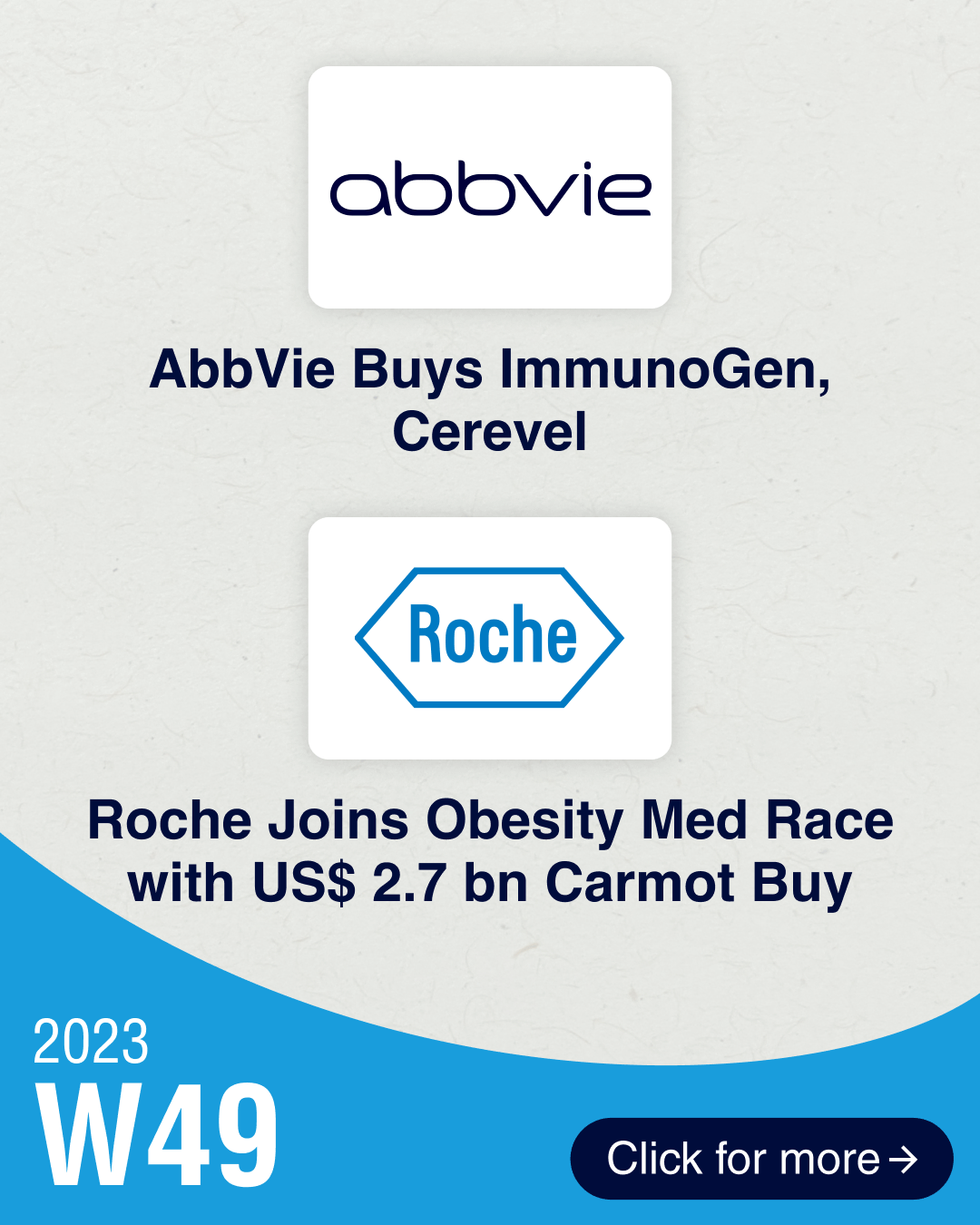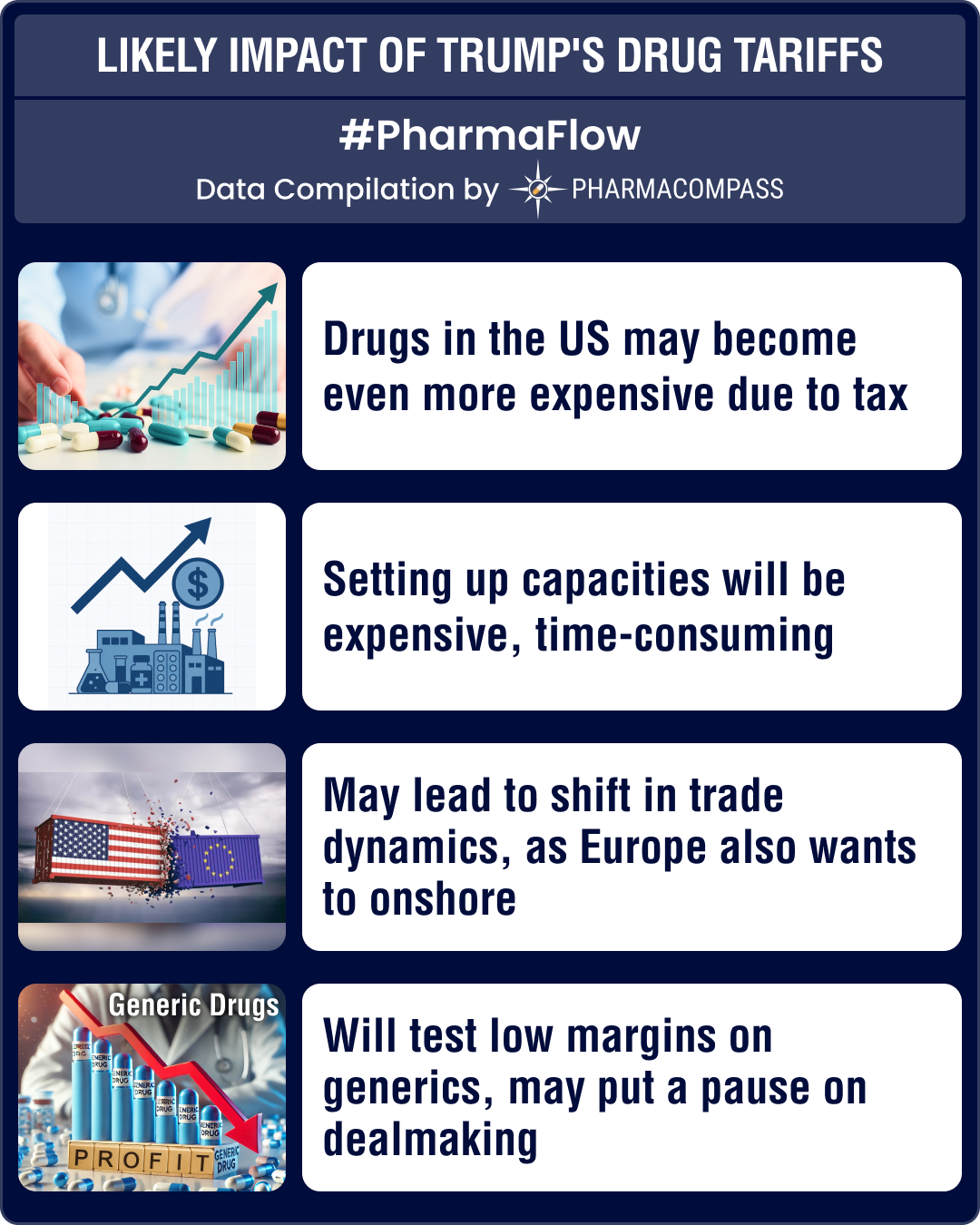
By PharmaCompass
2023-12-07
Impressions: 1,366 (Article) || 1 (Video)
As the year draws to a close, we are witnessing more M&A activity in the biopharma world. AbbVie acquired two companies within a week — it bought ImmunoGen for US$ 10.1 billion to strengthen its presence in the antibody-drug conjugate (ADC) space, and it acquired Cerevel for US$ 8.7 billion for its strong portfolio of neurological and psychiatric drugs.
Alongside, we also witnessed the lucrative obesity market heat-up with Roche acquiring Carmot Therapeutics for US$ 2.7 billion and Altimmune announcing remarkable mid-stage results on its experimental GLP-1/glucagon dual receptor agonist — pemvidutide.
In the war on cancer, Eli Lilly’s Jaypirca won a second FDA approval. It is already approved to treat mantle cell lymphoma, and now it has been okayed for chronic lymphocytic leukemia. Both AstraZeneca and Sanofi are tapping into the powers of artificial intelligence to discover new drugs, and have tied up with AI firms Absci and Aqemia, respectively.
Merck received a blow as its highly anticipated experimental multiple sclerosis drug — evobrutinib — failed to achieve its primary goal in a late-stage trial.
Meanwhile, Johnson & Johnson has forecast its revenue growth in 2024 to come in at between 5 and 6 percent over strong demand for its cancer therapies.
AbbVie on shopping spree — buys ImmunoGen for US$ 10 bn, Cerevel for US$ 8.7 bn
AbbVie announced two big acquisitions last week. It is set to buy ImmunoGen for US$ 10.1 billion, that will give it access to Elahere (mirvetuximab soravtansine-gynx), its flagship first-in-class antibody-drug conjugate approved for platinum-resistant ovarian cancer (wherein patients relapse within six months of receiving platinum-based chemotherapy).
Elahere posted sales of US$ 212 million in the first three quarters of 2023, and is expected to achieve blockbuster status by 2030.
On Wednesday, AbbVie also announced it will buy neuroscience drugmaker Cerevel Therapeutics. The deal is valued at about US$ 8.7 billion. AbbVie’s shopping spree should come as no surprise as its blockbuster Humira now faces competition in both the US and Europe.
Roche joins weight management med race with US$ 2.7 billion Carmot buy
In the race to capture a share of burgeoning obesity drug market, Roche has acquired California-based Carmot Therapeutics, including its experimental weekly injection CT-388, for US$ 2.7 billion and an additional US$ 400 million in milestone payments. The dual GLP-1/GIP receptor CT-388 had a heartening phase 1 trial and is ready to be tested in humans but is not expected to hit the market until 2030.
Altimmune’s experimental weight loss med posts trial gains: Maryland-based Altimmune said its experimental GLP-1/glucagon dual receptor agonist pemvidutide achieved weight loss of 15.6 percent at 48 weeks in overweight or obese adults in a mid-stage trial. This could potentially put it on par with Novo Nordisk’s blockbuster Wegovy (semaglutide).
Pfizer dumps GLP-1 candidate: Pfizer has decided not to go ahead with its twice-a-day version of oral weight-loss drug danuglipron after most patients reported side effects like nausea and vomiting and dropped out of a mid-stage trial.
Meanwhile, the European Medicines Agency (EMA) will seek more data from GLP-1 drugmakers like Eli Lilly, Sanofi, and Novo in its investigation into suicidal thoughts among users of drugs like Ozempic, Wegovy, and Trulicity.
Lilly’s Jaypirca bags second FDA approval, to treat chronic lymphocytic leukemia
FDA has granted Eli Lilly’s blood cancer treatment Jaypirca a second approval after the drug won accelerated approval from the agency in January to treat mantle cell lymphoma (MCL), a rare cancerous condition. The drug has now been okayed in the US for chronic lymphocytic leukemia (CLL), where the bone marrow makes too many of certain white blood cells. Of the two, MCL is more aggressive. Jaypirca is the first and only non-covalent BTK inhibitor approved by the FDA.
In search of new drugs, AstraZeneca, Sanofi strike deals with AI firms
AstraZeneca has decided to tap into the power of artificial intelligence (AI) to develop an antibody for cancer by entering into a deal with AI biologics firm Absci Corporation. Absci’s integrated drug creation platform is capable of measuring millions of protein-protein interactions and generating data. AstraZeneca will use its expertise in developing oncology treatments.
Meanwhile, Sanofi has also struck a deal with fellow French AI firm Aqemia for up to US$140 million in upfront and milestone payments to use its quantum-inspired physics capabilities to accelerate the discovery of small molecule drug candidates.
EyePoint’s candidate for wet AMD meets all endpoints in mid-stage trial
EyePoint Pharmaceuticals’ mid-stage trial for its therapy, EYP-1901, a treatment for wet age-related macular degeneration (wet AMD) saw both dosages — 2 mg and 3 mg — achieve all primary and secondary endpoints. The results were comparable to Regeneron’s Eylea with less frequent dosing. The trial also showed that EYP-1901 had a favorable safety profile with no “ocular or systemic serious adverse events” being reported. EyePoint said it’s on track to achieve additional milestones for EYP-1901 for diabetic macular edema and non-proliferative diabetic retinopathy.
Merck’s highly anticipated multiple sclerosis drug flops in late-stage trial
Merck KGaA said its experimental multiple sclerosis (MS) drug evobrutinib failed to achieve its primary goal of reducing the relapse rate in patients in a late-stage trial compared to Sanofi's Aubagio (teriflunomide). The result deals a major blow to the family-controlled drugmaker. Analysts had predicted that a successful launch of evobrutinib was key to Merck’s goal of generating € 25 billion (US$ 27 billion) in sales by 2025, up from US$ 22.2 billion in 2022.
J&J forecasts up to 6% sales growth in 2024; sets 2025 sales target at US$ 57 billion
Johnson & Johnson has forecast its revenue growth in 2024 to come in at between 5 and 6 percent over strong demand for its cancer therapies Darzalex (daratumumab) and Carvykti (ciltacabtagene autoleucel) as well as its blockbuster Stelara (ustekinumab) used to treat psoriasis. Next year will be the first full year for the American multinational after it spun off its consumer health unit Kenvue.
Reiterating its 2025 drug sales goal of US$ 57 billion, J&J said it seeks to have at least 20 new therapies approved and expand the use of 50 treatments by 2030 as it continues to focus on high innovation and high growth areas. Stelara’s patent protection in the US is set to expire in 2025.
The PharmaCompass Newsletter – Sign Up, Stay Ahead
Feedback, help us to improve. Click here
Image Credit : Phisper Infographic by PharmaCompass license under CC BY 2.0
“ The article is based on the information available in public and which the author believes to be true. The author is not disseminating any information, which the author believes or knows, is confidential or in conflict with the privacy of any person. The views expressed or information supplied through this article is mere opinion and observation of the author. The author does not intend to defame, insult or, cause loss or damage to anyone, in any manner, through this article.”








